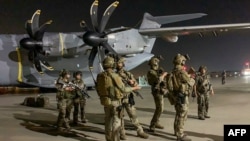America's NATO allies are scrambling to evacuate their citizens from Afghanistan amid the U.S. military withdrawal from the country and the collapse of the Afghan government. Many European officials have voiced fears that the Taliban takeover will increase the risk of terrorism and renew an influx of refugees into Europe.
Britain and other NATO allies began evacuating their citizens from Afghanistan on Sunday, along with hundreds of Afghan citizens who worked alongside them. France, Germany, Spain and Italy are also operating evacuation flights after U.S. troops reasserted control of the airport Monday, following chaotic scenes over the weekend.
Several European states are to outline soon their emergency asylum programs for interpreters and other Afghan nationals who worked alongside NATO troops and civilians over the past two decades. They are now seen as particularly at risk of Taliban reprisals.
Several allies joined the U.S.-led invasion of Afghanistan in 2001. NATO took control of the International Security Assistance Force in Afghanistan in 2003 and led the training program for Afghan forces after 2014. In addition to the 2,448 U.S. military service personnel killed in Afghanistan, other NATO member states have lost hundreds of troops in two decades of conflict.
In a press conference Tuesday, NATO Secretary-General Jens Stoltenberg blamed the country's political leadership for the capitulation to the Taliban.
"What we have seen in the last few weeks was a military and political collapse at a speed which had not been anticipated. Part of the Afghan security forces fought bravely, but they were unable to secure the country because ultimately, the Afghan political leadership failed to stand up to the Taliban and to achieve the peaceful solution that Afghans desperately wanted. This failure of Afghan leadership led to the tragedy we are witnessing today," Stoltenberg told reporters at NATO headquarters in Brussels.
The failure to build a democratic state in Afghanistan could have wider implications for NATO, said Natasha Lindstaedt, a U.S. foreign policy analyst at Britain's University of Essex.
"I think NATO might return to more limited aims, of just trying to maintain stability and deter rather than to engage in these grand interventions," she told VOA.
Britain's Defense Secretary Ben Wallace blamed the collapse of the Afghan government on the 2020 deal struck with the Taliban by former U.S. President Donald Trump.
"It was done directly to the Taliban. It didn't involve the Afghan government — so (it) fatally potentially undermined the government of that day. We, as international partners, found it uncomfortable because we had deployed through a U.S. framework. We hadn't deployed in a unilateral manner. So, when they pulled that framework, we had to leave," Wallace told the BBC.
However, many European officials have also criticized the manner of the U.S. withdrawal.
"It was very abrupt, and it wasn't coordinated, and there wasn't much consultation at all from Biden and his administration with its NATO allies," Lindstaedt said. "(NATO allies) couldn't really stay there because they were dependent upon the U.S. military power providing that type of support."
Meanwhile, European leaders are also wary of the longer-term consequences of the Taliban takeover. French President Emmanuel Macron gave a televised address Monday evening.
"An historic turning point is underway in Afghanistan, far from our borders, but with major consequences for the entire international community, for Europe and for France," Macron said.
"Afghanistan's destabilization risks causing irregular migration to Europe. France, as I've said, has and will continue to do its duty for those who are most threatened. … Europe cannot be the only ones to take on consequences of the current situation," he added.
Macron also warned of the increased terror threat.
"Terrorist groups are present in Afghanistan and seek to profit from the destabilization. The United Nations' Security Council will have to come up with a common and united answer," the French president said.
That threat extends beyond the region and has implications for the global fight against terrorism, said analyst Raffaello Pantucci of the S. Rajaratnam School of International Studies in Singapore.
"I think there's going to be an undoubted sense of wind of victory blowing through the sails of jihadists around the world as they say, 'Look, victory is attainable. This isn't a hopeless struggle. Keep to the fight, stick to your beliefs, and 20 years later, you can end up winning this war.' And I think that narrative will carry them forward for some time into the future," Pantucci told Agence France-Presse.
"I think it remains to be seen the degree to which Afghanistan will become a base once again for international terrorist groups to launch attacks outside. I think certainly al-Qaida will be rejuvenated by this and will strengthen itself," he added.
Several thousand Afghan asylum-seekers remain stranded on the Greek island of Lesbos, having fled to Europe in recent years. Several hundred staged a protest Monday against the Taliban takeover. Among them was Elena, who did not wish to give her full name, fearing reprisals for family members in Afghanistan.
"What will happen now in Afghanistan for (the) young generation? For children? For women's rights? Everything is destroyed by the Taliban," she told Reuters.
Those questions remain unanswered, as Western nations rush to leave Afghanistan, and the Taliban retakes the reins of power.
Some material from this report came from Reuters and Agence France-Presse.




